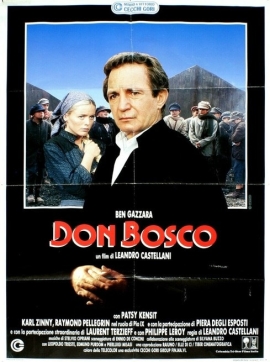The film's artistic choice has the entire biographical story narrated by an elderly Don Bosco, who returns in thought to his boyhood. He retraces all the actions taken to realize his greatest dream: to dedicate himself completely to the young. The film depicts how Don Bosco, with the help of don Borel and other priests, begins to lay the first bricks on what would later become the Salesian community, welcoming all the young people of Turin to the oratory. Despite his good intentions, he was thwarted several times by the politicians of the time and by insurrectionists, but he always managed to find a way forward. He then goes to Pope Pius IX and, years later, to Pope Leo XIII to seek support for his community, which in the meantime has grown so large and counts many followers. In the finale, Don Bosco thanks Our Lady in a prayer, believed to be the source of his charitable work, and then surrenders his soul to God.
All first-rate people were chosen for the making of the film: the direction was entrusted to Leandro Castellani, an already established director, screenwriter and author, and the winner of numerous awards in his career; while the entire cast shines in its own light, with elements varying in nationality and origin: from British star, of music, too, Patsy Kensit, to a great theatrical performer like the Italian Piera Degli Esposti, to the famous French film actor Philippe Leroy.
But above them all, as mentioned, the Italian-American Ben Gazzara stood out: an actor of the strict school, attentive, prepared, an almost maniacal professional, during breaks "he did not want to disperse his concentration; he would go over or rather rethink his scene," director Castellani revealed a few years ago on the occasion of the actor's death.
"Tall, imposing, more than he appeared in the movies and on TV ... he had aroused some astonishment (...). But I was right, because Ben, removed from the usual roles of ‘villain,’ of the ‘bad guy’, knew how to give off for that unusual character a credible virile sweetness."
According to Castellani, Ben Gazzara "had also loved that role very much out of a sense of gratitude to the Salesian oratory that, in his New York, had taken him in, a street boy, the son of poor Sicilian emigrants, teaching him how to live and act. I think he gave the best of himself in that very real character, not the Don Bosco of the popular piety figurines but the Don Bosco defender of boys and young people, against the 'strong powers' one would say today." And this assessment by Castellani had been shared by none other than the Pope at the time: "Even John Paul II told me that he greatly appreciated it: 'I liked that Don Bosco, so energetic,' and he had underlined the phrase with a gesture of his hands."
While a choral work, it was certainly to a good extent thanks to Gazzara's performance that the film was not just a biographical picture of the saint. In fact, the Italian-American actor brought out all his human and religious stature, so much so that he said, for his part, "A saint is one who commits his whole life fighting for a purpose. Without awareness of sainthood and I did not want to make a 'postcard-saint,' but a man."
For ANS readers, we highlight the Italian version.


